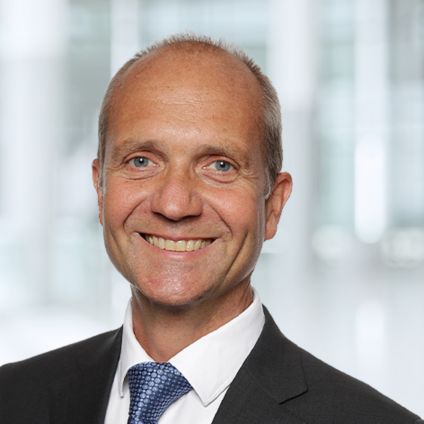Survey by KPMG AG Wirtschaftsprüfungsgesellschaft and the German Eastern Business Association
Central and Eastern Europe continues to gain in economic importance: 22% of German companies are considering relocating production to the region
Central and Eastern Europe continues to gain in economic importance
- More than half of the companies (55%) expect the region to gain economic importance by 2030
- Central and Eastern Europe is becoming more attractive as an investment location: 42% intend to invest here within a year; 56% within five years
- Top 3 location factors: Domestic demand (40%), availability of qualified specialists (37%) and low labour costs (33%)
- Top 3 target countries: Poland (51%), Romania (43%) and Ukraine (41%)
- Biggest challenges: political risks or lack of security (67%), corruption (38%) and bureaucratic hurdles (31%)
- Almost every second company surveyed is considering investing in Ukraine
Berlin, February 5, 2025
German companies operating in Central and Eastern Europe expect the region to become increasingly important as a market and investment location. More than every second company surveyed (55%) expects the economic relevance of the twenty countries to grow by 2030. More than half of those surveyed plan to invest in the region by 2030.
Poland, the largest economy in Central and Eastern Europe, is the preferred investment destination of the German companies surveyed with investment intentions. After Poland and Romania, Ukraine is the third most popular destination for companies looking to invest, followed by Hungary and the Czech Republic.
Just under half of the companies surveyed (45%) rate their current business situation in the region as positive: 36% rate their situation as "good"; 9% even rate it as "very good". 38% are satisfied and only 16% rate their business situation as rather negative.
Over a five-year horizon, companies are even more optimistic: four out of five (80%) expect the business situation to improve even further.
These are the key findings of the "German CEE Business Outlook 2025". The survey by KPMG in Germany (KPMG) and the German Eastern Business Association (OA) was conducted between November 20 and December 31, 2024. It analyses the business expectations of German companies in Central and Eastern Europe. 133 companies with business in Eastern Europe took part in the survey. For the purposes of this study, Central and Eastern Europe refers to the following countries: Albania, Bosnia and Herzegovina, Bulgaria, Croatia, Czech Republic, Estonia, Georgia, Hungary, Kosovo, Latvia, Lithuania, Moldova, Montenegro, North Macedonia, Poland, Romania, Serbia, Slovakia, Slovenia, Ukraine.
"The region is a realm of opportunity in which the business possibilities outweigh the challenges that still exist. We would therefore like to see progress finally made in deepening the internal market and further EU integration in eastern and south-eastern Europe to make this region even more accessible," says Michael Harms, Managing Director of the Committee on Eastern European Economic Relations.
More than half of companies plan to invest in the region by 2030
Investment momentum in Central and Eastern Europe remains strong. Within the next twelve months, 42% of the German companies surveyed plan to invest, 17% with a volume of more than 5 million euros. In the long term, the propensity to invest will continue to increase: 56% of companies intend to make such investments by 2030.
For most German companies with investment plans, the focus is on expanding or setting up production capacities. For the current financial year, 30% say this is the case. By 2030, the proportion will rise to 33%. The service sector also remains an important investment target for 28% of companies. The region also scores highly when it comes to exports and sales: 18% of companies are planning to invest in these areas.
German companies have attractive opportunities to organize their sourcing strategies efficiently and maintain their competitiveness. Given the growing importance of nearshoring and more resilient supply chains in uncertain geopolitical times.

Relocation of production from Germany to Central and Eastern Europe under scrutiny for 2025
More than one in five companies surveyed (22%) are considering relocating production activities from Germany to Central and Eastern Europe. Within the next twelve months, 19% are considering such a move. However, only 3% have already made the decision.
The well-known weaknesses of Germany as a business location are causing companies in this country to relocate their production abroad. Central and Eastern Europe is a preferred location. The German economy is already heavily invested there, is familiar with the area and at the same time remains close to its home country,’ explains Andreas Glunz (KPMG).
Poland, Romania and Ukraine are top investment locations
Poland, Romania and Ukraine are the three most important target countries for German investors in the short and medium term. Poland, the largest economy in Central and Eastern Europe, is the preferred destination of the German companies surveyed with investment intentions. Almost one in two of them (48%) have already invested in the neighboring country to the east.
45% are planning further investments there in the next twelve months; 51% also within the next five years. The most important reasons for investing in Poland are its proximity to Germany (25%) and the ease of doing business (18%). In the short term, 45% of respondents are planning to invest in Romania; within the next five years, the figure is 43%.
Ukraine follows in third place: 35% of the companies surveyed plan to invest there this year, rising to 41% by 2030. Currently, one in five of the companies surveyed (21%) has already invested there. 18% want to invest in Ukraine in the event of a peace agreement.
"Ukraine has the potential to become a new energy hub for the European Union, an alternative production location and to play an important role for European companies in the areas of IT and outsourcing," says Nicolai Kiskalt, Head of the Central and Eastern Europe Desk at KPMG Germany. The Czech Republic recorded the strongest growth in investment interest with an increase of eight percentage points (rise from 23% in 2025 to 31% by 2030).
Local demand, skilled workers and low labor costs as locational advantages
The high domestic demand is the most important locational advantage in Central and Eastern Europe for 40% of companies. 37% of those surveyed value the availability of qualified specialists. A further third (33%) see the low labour costs as a decisive reason to be active in the region.
Security issues, corruption and bureaucracy are the biggest challenges
The German companies surveyed perceive the war in Ukraine and the threat from Russia as risks in the region. Two thirds of respondents (67%) see political risks and a lack of security in individual countries as the region's biggest locational disadvantages. This is followed at a considerable distance by problems caused by corruption in some countries in Central and Eastern Europe (38%) and bureaucracy (31%).
About the "German CEE Business Outlook 2025"
KPMG AG Wirtschaftsprüfungsgesellschaft and the Committee on Eastern European Economic Relations surveyed subsidiaries of German corporations and German companies with business activities in Eastern and Central Europe for the "German CEE Business Outlook 2025". A total of 133 companies took part. The survey was conducted between 20 November and 31 December 2024 and the questions focused on the economic prospects of German companies in the region as well as their challenges and business opportunities.
About KPMG
KPMG is an association of independent member firms with more than 275,000 employees in 142 countries and territories. KPMG is also one of the leading audit and advisory firms in Germany and employs over 14,500 people at 28 locations. Our services are divided into the following areas: Audit, Tax, Performance & Strategy, Deal Advisory and Consultancy. Legal advisory services are provided by a legally independent company.
KPMG in Germany has established Country Practices for all relevant business corridors between Germany and other countries or regions. All country practices are staffed by country experts who are familiar with the special features and regulatory environment of these markets, work regularly in these countries and advise German and global multinational companies on their country and corridor-related issues.
About the Committee on eastern European Economic Relations
The Committee on Eastern European Economic Relations (founded in 1952) promotes German business in 29 countries in Central, Eastern and South-Eastern Europe, the South Caucasus and Central Asia. German trade with Eastern Europe accounts for around one fifth of total German foreign trade, making it more important than trade with the USA and China combined. The Committee on Eastern European Economic Relations has around 350 member companies and associations and is supported by six leading German business organisations - BDI, BGA, Bankenverband, DIHK, GDV and ZDH.
Press contact:
KPMG AG Wirtschaftsprüfungsgesellschaft
Katrin Häbel
Head of Corporate Communications
T +49 69 9587 4228
khaebel@kpmg.com | www.kpmg.com/de
Ost-Ausschuss der Deutschen Wirtschaft e.V.
Christian Himmighoffen
Head of Corporate Communications
T +49 30 206167 122
c.himmighoffen@oa-ev.de | Ost-Ausschuss der Deutschen Wirtschaft

